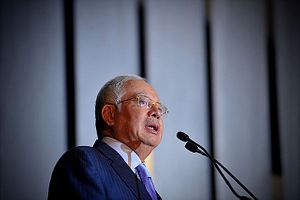On December 22, the Malaysian Senate passed a controversial national security bill that the government says will strengthen its ability to counter rising threats and critics have slammed as a blow to democracy and human rights.
The National Security Council (NSC) bill, which passed Malaysia’s Lower House in early December, strengthens the existing NSC to make it more efficient and effective coordinating body to streamline policies and the country’s security strategies. But it also affords the government the ability to declare so-called “security zones,” within which authorities would have wide powers of arrest, search and seizure without a warrant. Having now passed the Senate, it only needs the assent of Malaysia’s King before becoming law.
In a speech in October, Malaysian Prime Minister Najib Razak had argued that the NSC bill was a necessary step. Given the rise of threats from non-state actors, Najib said that there was a need to bring it on par with similar agencies in the United States, Japan, Britain and other countries. Malaysian officials, Najib said in a separate address to the United Nations in September, had already arrested over 100 citizens suspected of links to the Islamic State, with several deadly plots already foiled domestically (See: “Exclusive: US, Malaysia and the War Against the Islamic State”).
But since its introduction this month, critics have been assailing the bill for various reasons. Much of the criticism has been centered on the wide-ranging powers within designated “security zones,” which Najib did not explicitly mention in his October speech first outlining the NSC bill. Some claimed that this handed sweeping powers to Najib, since it bore similarities to a declaration of emergency which only the King has the ability to institute constitutionally. Others added that even if it were constitutional, this issue was still a concern given past attempts by the government to use such regulations to silence political opponents. Several other worries were also raised, including whether those implementing the law would be immune from prosecution.
Nonetheless, the bill passed without amendment on Tuesday. Shahidan Kassim, minister in the prime minister’s department, also said that the attorney general’s chambers had cleared the bill of any constitutional breaches and reiterated that the NSC bill does not grant emergency powers to the Council or the prime minister. The Malaysian government has been fiercely rebutting criticism by opponents, insisting that a security zone is different from a state of emergency and that Najib can only declare a security zone with advice from the NSC. Shahidan also said that the government was open to further improvements to the Bill.
“If there is weakness in the act, the government will table amendments in the coming Parliament sitting,” he said according to The Malaysian Insider.
But opponents have criticized the government for ramming through the legislation in spite of fierce criticism. Ambiga Sreenivasan, the president of the National Human Rights Society of Malaysia (Hakam), wrote that the Malaysian people were deprived of a more open debate on the bill by the very people who swore to uphold the constitution and represent the people.
“How will they explain their role in passing a bill in a rush that undermines our parliamentary democracy and the rule of law and puts us all in peril at the behest of one person?” she asked.

































